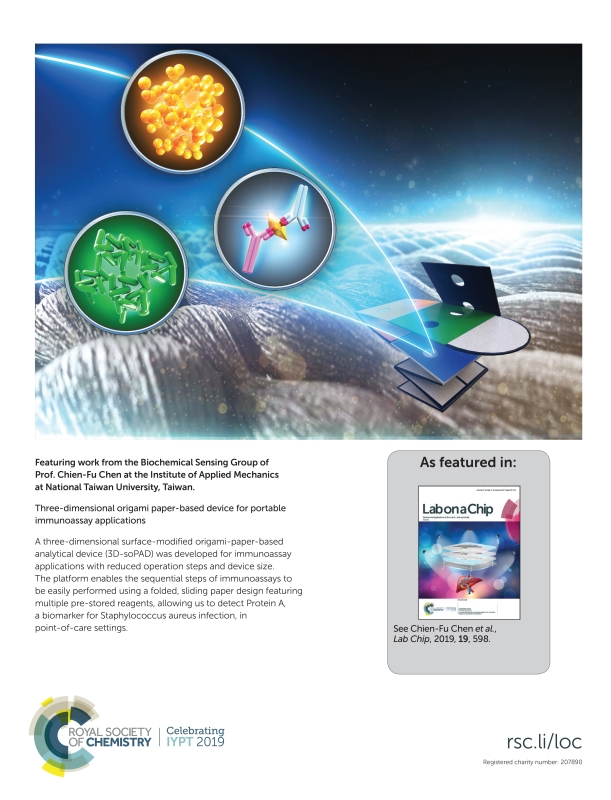Prof. Chien-Fu Chen Designs a Three-Dimensional Origami Paper-Based Device for Portable Immunoassay Applications
A research team led by Dr. Chien-fu Chen, an Associate Professor at the Institute of Applied Mechanics, developed a three-dimensional surface-modified origami-paper-based analytical device (3D-soPAD) for immunoassay applications. The detection platform utilizes a folded, sliding paper design featuring multiple pre-stored reagents. This special design facilitates the performance of immunoassays by streamlining the process and reducing the size of the device.
Chen’s team demonstrated how 3D-soPAD can detect Staphylococcus aureus infections in human synovial fluid. This research was designated for the February 2019 cover issue of the Royal Society of Chemistry’s journal: Lab on a Chip.
Infections are often caused by the invasion of infectious agents, such as bacteria, viruses, and other microorganisms. Severe infection can lead to sepsis, bacteremia, pyaemia, toxic shock syndrome, and even death. In order to provide treatment and prevent the development of antibiotic resistant bacteria, diagnostic tests play a crucial role in clinical diagnosis. However, diagnostic tests tend to be costly and inaccessible in many parts of the world. In hopes of improving the screening time and the test results, Chen’s team developed an efficient, affordable, and portable microfluidic immunoassay device which only requires a small volume of sample specimen.
According to Chen, the platform is mainly composed of modified carboxymethyl cellulose instead of the more expensive nitrocellulse. After applying chemical surface treatment, the detection area’s carboxymethyl cellulose provides covalent bonding sites for bio-recognition molecules, which enhances the sensitivity and specificity of the device. In the storage antibody test, trehalose and sucrose were added as stabilizing reagents and freeze-dried on the surface of the cellulose paper using a lyophilizer. This enables a longer preservation of the antibody and also increases the portability of the platform.
Unlike conventional immunoassays, which require a greater number of reagents and a longer operation time, the vertical flow immunoassay achieves low dead volume, a shorter fluidic path, and uses a sliding strip origami design to minimize manual operation steps and the number of reagents required. This research targeted protein A (a biomarker for Staphylococcus aureus infection) to demonstrate the performance of the 3D-soPAD platform, yet the device can also be used to detect other bacteria after altering the combination of antibodies.
The origami-paper-based analytical device is easy to replicate and can provide sensitive, high throughput diagnosis with a small sample specimin. Chen and his team are dedicated to continuing their research on point-of-care testing and developing new approaches to promote personal medicine and prevent communicable diseases in resource-limited areas.
The team would like to acknowledge the financial support received from the Ministry of Science and Technology (MOST) and NTU’s Higher Education Sprout Project.

3D-soPAD selected as Lab on a Chip’s back cover